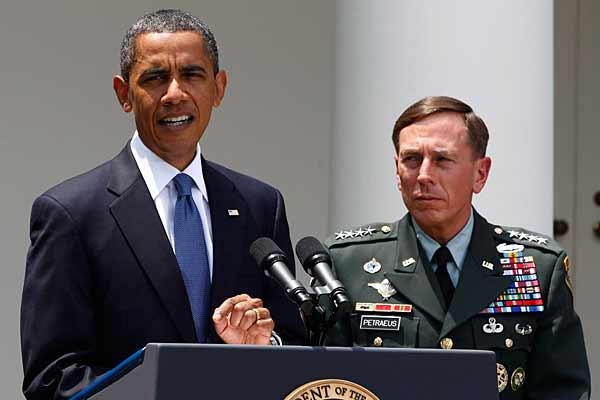Politically what these guys don’t get is it’d be a lot easier for me to go out and give a speech saying, ‘You know what? The American people are sick of this war, and we’re going to put in 10,000 trainers because that’s how we’re going to get out of there.’
– President Obama
Obama’s Wars by Bob Woodward is as much about the political wars that are waged in the administration as it is about the Afghanistan War. Woodward continues where he left off with the Bush at War series as he chronicles President Obama’s dilemmas in dealing with the inherited morass of the Afghanistan War. The narrative begins right after the 2008 election and continues through to late 2010, throughout which the main focus of the book was the problems of Afghanistan, the proposed solutions, and the politics of the war. The heroes and villains of this modern history depend largely upon your worldview, however, there’s little doubt that President Obama is portrayed in a complimentary light as a calculating intellectual with a goal of reining in the mess of the Afghanistan War.
The comparisons of Afghanistan to Vietnam were taboo in both the military and in the administration, however, for many it rang uncomfortably true. The situation in Afghanistan was extremely bleak when Obama took the reins as President. The overriding issue and concern was the problem of insurgents and al-Qaeda taking refuge across the border in Pakistan. The Pakistani government was centrally weak and could not only do little about the problem but also turned a blind eye to much of it as they hedged both sides. Pakistan’s obsessive concern is with India and their interests are solely shaded with that concern, to that point the US has not been able to align US and Pakistan interests and therefore the insurgency maintained safe haven in Pakistan. In addition to the Pakistan problem, was the fact that Afghanistan was a failed state with no competent government, massive corruption, and no real military or police, making the state almost totally dependent on the US military to provide security. Though there were several other issues with Afghanistan, those two were the overriding dilemmas.
As soon as Obama was into the White House he already had a standing order from the Bush Administration for 30,000 more troops to Afghanistan. Obama reluctantly signed it and ordered a full assessment on the Afghanistan War and wanted to see improvement of the situation before another deployment decision was to be made. Bush demanded his administration be lock step with little to no dissension, contrasting that, Obama encouraged much dissension and wanted options before making a decision. This style allowed several different camps to plead their case for solutions in Iraq and created a power politics situation which the military took full advantage. The overriding theme of Obama’s War is the decision whether to grant General McChrystal’s request for 40,000 more troops in Afghanistan in order to conduct a more effective CounterInsurgency (COIN) campaign which could last several years into the future. Admiral Mullen, Gen. Petraeus, and Gen. McChrystal were pushing hard for this option, whereas, others in the cabinet were highly skeptical of sending more troops into what appeared to be a hopeless situation, a la Vietnam.
The crux of the book is the documentation of the political battles that took place with regards to adding the 40k troops. The military brass, after rebounding from their emasculation from Donald Rumsfeld, became at times defiant. Vice President Biden counters the military quite well with an aggressive bent that Obama, as Commander in Chief, could not possibly do himself. Biden proposes a “hybrid” option of 20k troops that focuses more CounterTerrorism than COIN. Yet when the President asks the military for other options than the 40k COIN, they impudently try to box him in by not giving any other realistic option and stating that anything else will be a failure. Eventually the President asserts himself and asserts his power in an admirable manner. Obama decides to grant 30k and personally writes the terms and orders sheet which is highly unusual. Even after that the military still made plays to get more troops in with backhanded methods which infuriated Obama.
Woodward’s books rarely delve into motivation or analysis, instead chronicling and allowing the readers to come to their own conclusions. However, some interesting aspects are left out of Obama’s Wars that leads one to certain questions. First, the option to leave Afghanistan is totally off the table and the administration is in full agreement, yet why? This is perplexing, considering that Obama even used it as a threat to the military, see the opening quote above. Secondly, the motivation for the military’s stubborn insistence on a 40k COIN plan is never really discussed yet the issue is really the heart of the book. Most likely:
- The military cannot and will not “lose” a war. Currently Afghanistan is a losing proposition. The military is inherently a win at all costs organization, hence, the need for civilian oversight.
- General Petraeus is generally recognized as the father of modern COIN and any failure of a COIN operation reflects poorly on his legacy and career.
- Unending war justifies the enormous military budget. Pull out of Afghanistan and what’s next, no funding for that new aircraft carrier? The military is enormously important, as is our national security, yet it must compete for it’s piece of the budget pie too.

Don’t be surprised when Petraeus makes a run at the Presidency. This obstinancy will all look prescient in the future.
may you know as you read.